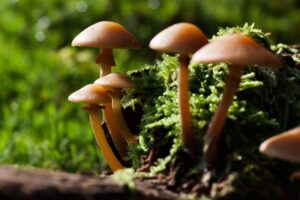
The Gut-Brain Connection: How Psychedelics May Affect Digestion and Mood
How Psychedelics May Affect Digestion , The gut-brain connection has become an increasingly popular topic in health and wellness circles. Scientists have uncovered a complex communication network between the gut and brain, often referred to as the “gut-brain axis.” This bidirectional relationship influences various bodily functions, including digestion, mood regulation, and overall well-being. With the resurgence of interest in psychedelics for mental health and cognitive enhancement, researchers are now exploring how substances like psilocybin, LSD, and ayahuasca may influence the gut-brain axis and impact digestion and mood.
Understanding the Gut-Brain Axis
The gut-brain axis consists of a dynamic communication network that involves the central nervous system (CNS), enteric nervous system (ENS), and the gut microbiome. The vagus nerve, a major component of this connection, plays a crucial role in transmitting signals between the gut and brain. In addition to neural pathways, the gut-brain axis relies on hormonal and immune signaling to maintain homeostasis.
Recent studies highlight the gut’s influence on mental health through the production of neurotransmitters such as serotonin, dopamine, and gamma-aminobutyric acid (GABA). In fact, approximately 90% of serotonin, a neurotransmitter that regulates mood, sleep, and appetite, is produced in the gut. Given this intimate link, disturbances in gut health are often associated with mood disorders such as anxiety, depression, and stress.
How Psychedelics May Affect Digestion
Psychedelics and Their Impact on the Gut-Brain Axis
Psychedelics are known for their profound effects on consciousness, perception, and mood. However, their potential impact on gut health and digestion is an emerging area of interest. Some potential mechanisms through which psychedelics may influence the gut-brain axis include:
1. Serotonergic Modulation
Classic psychedelics like psilocybin and LSD primarily act on serotonin (5-HT2A) receptors in the brain. Since serotonin plays a significant role in both gut motility and mood regulation, psychedelics could potentially influence digestive function and emotional well-being simultaneously. Some users report experiencing improved digestion and reduced gastrointestinal discomfort following psychedelic experiences, which could be attributed to the modulation of serotonin levels.
2. Reduction of Inflammation
Inflammation is a key factor in gut disorders such as irritable bowel syndrome (IBS) and inflammatory bowel disease (IBD). Psychedelics have shown promising anti-inflammatory properties by reducing the release of pro-inflammatory cytokines and modulating the immune response. Lower levels of gut inflammation could lead to improved digestion and a reduction in symptoms associated with chronic gut conditions.
3. Alteration of Gut Microbiota
The gut microbiome consists of trillions of microorganisms that play a crucial role in digestion, immunity, and neurotransmitter production. Emerging research suggests that psychedelics may have a direct impact on the gut microbiota composition. Some anecdotal evidence indicates that regular psychedelic use may promote a healthier gut microbiome by encouraging microbial diversity and reducing harmful bacteria linked to gut dysbiosis.
4. Stress Reduction and Improved Digestion
Chronic stress is a major contributor to gut dysfunction, leading to symptoms such as bloating, constipation, and diarrhea. Psychedelics, particularly psilocybin, have been found to alleviate stress and anxiety by promoting neuroplasticity and enhancing emotional processing. As stress levels decrease, the gut can function more efficiently, leading to improved digestion and nutrient absorption.
The Role of Microdosing and Medicinal Mushrooms
Microdosing psychedelics, such as psilocybin, has gained popularity for its potential benefits in enhancing mental clarity and mood. Additionally, medicinal mushrooms like Lion’s Mane, known for their neuroprotective properties, have been shown to support the gut-brain axis by promoting cognitive function and gut health. Lion’s Mane has been linked to the stimulation of nerve growth factor (NGF), which can aid in repairing gut lining and improving communication between the gut and brain.
Another beneficial medicinal mushroom for gut health is Reishi, which possesses powerful anti-inflammatory and immune-boosting properties that may help in managing gut disorders and promoting overall digestive health.
Explore our range of microdosing products and medicinal mushrooms to support your gut-brain health:
Psychedelics and Specific Gut Disorders
Given the connection between the gut and mental health, psychedelics may offer potential benefits for individuals suffering from gastrointestinal conditions linked to psychological factors. Some potential areas of impact include:
- Irritable Bowel Syndrome (IBS): Since IBS is often exacerbated by stress and anxiety, psychedelics may help alleviate symptoms by reducing psychological distress and improving gut motility.
- Inflammatory Bowel Disease (IBD): While more research is needed, the anti-inflammatory effects of psychedelics could provide relief for individuals with chronic inflammation in the digestive tract.
- Functional Dyspepsia: Individuals experiencing persistent digestive discomfort without an apparent cause may benefit from the serotonin-modulating effects of psychedelics, which could enhance gut-brain communication.
How Psychedelics May Affect Digestion
Considerations and Potential Risks: How Psychedelics May Affect Digestion
While the potential benefits of psychedelics on digestion and mood are promising, it is essential to consider potential risks and limitations. Some individuals may experience gastrointestinal discomfort, nausea, or diarrhea during psychedelic experiences. These effects are typically transient and may be linked to the activation of serotonin receptors in the gut.
Additionally, individuals with pre-existing gastrointestinal conditions should approach psychedelic use with caution, as the impact on gut health is still not fully understood. Consulting a healthcare professional before experimenting with psychedelics for gut-related issues is highly recommended.
Supporting Gut Health with Microdosing Products
Microdosing products, such as those offered by Microdose Bros, can support gut health and mood regulation by harnessing the power of medicinal mushrooms and psychedelics. Products like Lion’s Mane, known for its neuroprotective and gut-enhancing properties, can help stimulate nerve growth factor (NGF), promoting gut lining repair and improved gut-brain communication. Additionally, Reishi mushrooms, with their anti-inflammatory properties, can aid in reducing gut inflammation and supporting overall digestive health.
Incorporating these natural supplements into a daily routine may help enhance gut microbiota balance, support cognitive function, and reduce stress levels that negatively impact digestion.
Discover our range of microdosing products and medicinal mushrooms at Microdose Bros.
Conclusion
The gut-brain connection plays a pivotal role in both physical and mental health, and psychedelics may offer a novel approach to enhancing this relationship. By modulating serotonin levels, reducing inflammation, and promoting stress relief, psychedelics have the potential to improve digestion and mood simultaneously. However, more research is needed to validate these findings and develop safe, effective treatments that harness the power of psychedelics for gut health.
For individuals exploring psychedelics for gut-related concerns, it is crucial to prioritize a holistic approach that includes a balanced diet, stress management techniques, and professional guidance. With the right combination of lifestyle changes and psychedelic exploration, achieving optimal gut-brain harmony may become an attainable goal.






No comment yet, add your voice below!